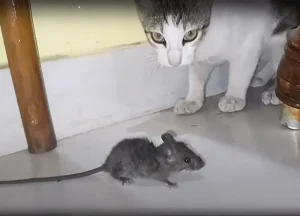Yes, it is generally safe to be around cats while pregnant, but it’s crucial to avoid handling cat litter. Experts warn pregnant women about the risk of toxoplasmosis from contaminated cat feces.
Being around cats during pregnancy raises common concerns among expectant mothers, primarily due to the associated risk of contracting toxoplasmosis. This infection, caused by the parasite Toxoplasma gondii, can lead to serious health issues for the unborn baby, including birth defects and miscarriage.
Pregnant women can safely enjoy their feline companions by taking simple precautions. The most important measure is to delegate the task of cleaning the litter box to someone else, as this is the primary way the parasite is transmitted. Regular hand washing after petting a cat, avoiding stray cats, and keeping indoor cats from hunting can further minimize the risk. With these strategies in place, expectant mothers can safely maintain their bond with their beloved pets throughout their pregnancy.
Potential Risks
An expectant mother often questions the safety of household environments. Concerns arise when cats are part of the family unit. The risks associated with being around cats during pregnancy warrant careful consideration. An insightful look into this matter reveals potential health and behavioral concerns. Expert opinions emphasize understanding and managing these risks effectively.
Toxoplasmosis Infection
Toxoplasmosis is a notable risk for pregnant women. This infection stems from Toxoplasma gondii, a parasite. Cats often host this parasite, shedding it through their feces. Pregnant women must practice strict hygiene to avoid exposure.
- Avoid handling cat litter: If possible, someone else should deal with the litter box.
- Wear gloves: If contact is unavoidable, gloves provide a barrier of protection.
- Wash hands thoroughly: Immediately after any potential exposure, cleanliness is crucial.
Doctors advise regular screening if exposure is suspected. Early detection means better management. Keeping cats indoors can also reduce the risk. It prevents them from hunting and eating infected prey.
Behavioral Risks
Cats exhibit varied behaviors that may present risks. Pregnant individuals should be aware of these to ensure safety. In general, cats are curious and seek attention, which can lead to accidental injuries.
| Behavior | Description | Precaution |
|---|---|---|
| Scratching | Cats may scratch as part of play or defense. | Maintain distance during playtime; trim cat nails regularly. |
| Jumping | Cats might leap onto unsuspecting individuals. | Stay attentive; discourage jumping. |
| Biting | Stress or overstimulation can lead to biting. | Learn to recognize signals; avoid overhandling. |
Expectant mothers should avoid rough play. Gentle interactions are best. Cat proofing certain areas ensures personal space. This space should remain off-limits to the cat. Structured playtimes and proper training can also mitigate risks.
Preventive Measures
Expecting a baby brings joy and calls for caution, especially around pets like cats. Concerns about safety lead to careful steps. Here’s how to enjoy your feline’s company safely during pregnancy.

Hygiene And Cleaning
Regular hand washing keeps infections at bay when you touch your cat. Use soap and warm water for best results. Clean cat belongings regularly, too.
Avoid the litter box if possible. If not, wear gloves and a mask for the chore. Wash hands thoroughly after.
Keep your cat’s living space clean. This limits bacteria and parasites. Disinfect bowls, beds, and toys often.
Behavioral Guidelines
Educate yourself on your cat’s body language. This prevents surprise scratches or bites. Play gently to avoid rough behavior. Ensure your cat’s vaccinations are up-to-date.
Limit outside play for your pet. Outdoor cats face more risks for diseases. Indoor cats pose less danger to pregnant moms.
Keep your cat away from your sleeping area. A clean, separate space for the cat ensures hygiene for your rest zone.
Health Benefits
Expecting mothers often ask about the safety of being around cats. Beyond safety, interacting with cats can actually provide health benefits during pregnancy. From emotional support to reducing stress, the presence of a feline friend might just be what the doctor ordered.
Emotional Support
Pregnancy can be an emotional rollercoaster. Cats can offer unconditional love and companionship. Their gentle purring and affectionate nuzzles can uplift spirits on tough days. Time spent with a cat can enhance the feeling of emotional well-being.
- Increase in positive hormones
- Feeling of being understood and valued
- Access to non-judgmental companionship
Reduced Stress Levels
High stress can be harmful in pregnancy. Cats can help lower stress levels. Studies suggest that the simple act of petting a cat can reduce the production of stress-related hormones. Cats help create a calm environment, ideal for a healthy pregnancy.
| Activity | Stress Reduction Benefit |
|---|---|
| Petting your cat | Decreases cortisol, the stress hormone |
| Listening to purring | Soothes nerves, induces relaxation |
| Playing with your cat | Boosts mood, promotes laughter |
Consulting A Healthcare Provider
Consulting a Healthcare Provider is a crucial step for pregnant women considering the safety around cats. A professional’s advice ensures you’re aware of any potential risks. They can help craft a personalized plan for your needs.

Risk Assessment
Before you continue cuddling your feline friend, a thorough risk assessment is necessary. Your healthcare provider can test for any existing allergies or infections. They also check if you have immunity to common cat-related diseases.
Key areas they’ll review include:
- Previous Exposure: Past contact with cats may influence immunity.
- Infection Risks: Evaluating the chance of contracting diseases.
- Overall Health: Your health affects you and your baby’s vulnerability.
Guidance For Expecting Mothers
Following the risk assessment, personalized guidance is provided. It may include:
- Avoiding Litter Boxes: To reduce the risk of toxoplasmosis.
- Safe Handling: Washing hands after touching cats to avoid infections.
- Limiting Play: Keeping rough play at bay to prevent scratches or bites.
It’s essential to follow the guidance for the health of you and your baby. By consulting with a healthcare provider, expecting mothers can make informed decisions on safely being around cats during pregnancy. Ignoring expert advice could put both mother and child at risk.
Additional Advice
Welcome to the segment on ‘Additional Advice’ for expectant mothers considering the safety of being around cats during pregnancy. Essential topics like preparing the home and understanding feline behavior need attention for a harmonious setup.
Preparing The Home Environment
Creating a safe and healthy living space is critical when expecting. Cats can adapt to changes, yet a few adjustments ensure well-being for all.
- Designate a cat zone away from food areas.
- Install cat-proof locks on cabinets, particularly where cleaning supplies are stored.
- Clean litter boxes regularly while wearing gloves or delegate this task.
- Ensure the cat’s bedding and toys are clean.
- Regular vet checks keep the cat healthy and vaccinations up to date.
These measures help mitigate risks, thus creating a harmonious home for both felines and family members.
Understanding Feline Behavior
Comprehending how your cat communicates and acts is beneficial. Knowledge promotes a stress-free environment for both you and your feline.
- Notice the cat’s body language for signs of stress or discomfort.
- Avoid rough play that can lead to scratches or bites.
- Give the cat personal space and do not force interactions.
- Keep routine schedules to limit behavioral issues.
- Be patient as cats need time to adjust to new household dynamics.
Understanding these elements of feline behavior are crucial for maintaining a happy and stress-free home activity.
Frequently Asked Questions
Can Pregnant Women Safely Interact With Cats?
Yes, pregnant women can safely interact with cats with precautions. It’s important to avoid handling cat litter to prevent toxoplasmosis. Always wash hands after petting cats.
What Are The Risks Of Toxoplasmosis From Cats In Pregnancy?
Toxoplasmosis infection risks include birth defects and miscarriage. Pregnant women should not clean litter boxes. If necessary, they should wear disposable gloves and wash hands afterwards.
How To Reduce Toxoplasmosis Risk While Pregnant?
To reduce toxoplasmosis risk, wear gloves when gardening, thoroughly cook meat, and wash vegetables. Avoid changing cat litter or delegate it to someone else.
Do Indoor Cats Pose A Toxoplasmosis Risk For Expectant Mothers?
Indoor cats have a lower risk of carrying toxoplasmosis, but caution is advised. Avoiding litter box maintenance and handwashing after contact is still recommended.
Conclusion
Navigating pregnancy safely with cats is achievable. Consulting with healthcare providers and practicing good hygiene are essential steps. Keep these precautions in mind to enjoy your feline company without worry. Remember, informed measures mean embracing pet companionship and a healthy pregnancy journey.
Maybe you are interested:




